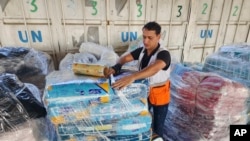UNRWA is sheltering nearly 800,000 people, or about half of the total population of Gazans who have fled their homes since an Israeli military campaign began over a month ago in response to deadly Hamas attacks on Israel on Oct. 7.
The agency chief, Commissioner-General Philippe Lazzarini, told donors on Monday that it had been slowly emptying a fuel depot on the Israeli border containing strategic reserves.
A request to the Israeli military to replenish it had gone unanswered, he said.
"That reservoir is now empty," Lazzarini said.
"If we project out a couple of days, by the 14th of November this will severely impact ambulances and major hospital operations. Some of them (hospitals) have a bit of solar but it is marginal, so those hospitals cease functioning," he said.
Already, many hospitals have had to close in Gaza due to war damage or lack of fuel, including al-Quds, one of the major hospitals in the north of Gaza that has been the focus of Israel's ground invasion.
Israel's military has so far refused imports of fuel into Gaza, saying they could be diverted to Hamas for military purposes.
UNRWA's fuel is also used to remove hundreds of tonnes of solid waste from increasingly overcrowded camps in southern Gaza, and Lazzarini said these services would soon halt.
Without fuel, desalination plants in the narrow, densely populated coastal strip used to provide drinking water to support at least 290,000 people will also stop on Nov. 15, he added.
"So the situation is very dire now and it's about to get much worse," Lazzarini told donors.









Forum